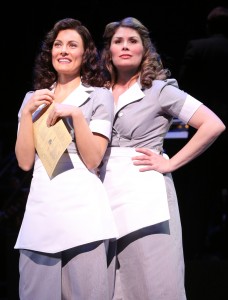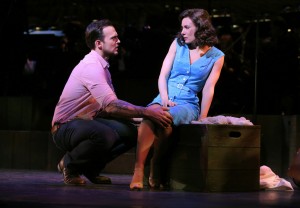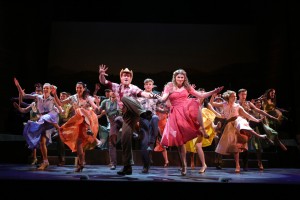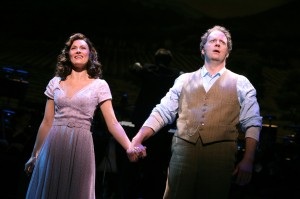Filichia Features: Make The Most Happy Fella’s Acquaintance
Filichia Features: Make The Most Happy Fella’s Acquaintance
For years, he was your stalwart leading man. He had the good looks, the great voice and the requisite masculinity. But, as Lorelei Lee taught us, “we all lose our charms in the end.” Now he’s not as swaggeringly handsome and he’s gone gray where he hasn’t gone bald. As Michael asks in I DO! I DO!, “When did that double chin appear?” Alas, it now accompanies a nearly doubled waistline.
You’ve been shunting him into character roles, but that’s a shame, for he still has that great voice. What to do, what to do?
In fact, The Most Happy Fella.
He’d play Tony, the affluent vineyard owner who’s past middle age but is smitten with Amy, a young waitress who’d just served his meal. Tony didn’t dare approach her, lest she be repelled by his looks and age, but instead left a piece of jewelry as a tip and a note that convinced that her “Somebody somewhere wants me and needs me.”
Amy’s been around the block and has begun to worry that she’ll never get another spin. Although her friend and co-worker Cleo now tells her to be careful, Amy engages herself in a correspondence and soon finds herself engaged. That Tony is handsome and young makes her swoon.
Wait. Didn’t we say that Tony was old, gray and heavy? Yes, but Amy doesn’t know that – because Tony sent her a picture of Joe, his ruggedly butch foreman. That does complicate matters, doesn’t it?
As the recent concert production at Encores! in New York proved, this 1956 musical is magnificent. And while its original run of 676 performances was enough to make it one of the 20 longest-running book musicals up to that time, The Most Happy Fella had the misfortune of opening a mere 49 days after My Fair Lady – “the musical of the century,” as critics liked to call it. Lady was nominated for ten Tonys and won six; Fella was “only” up for six and won none. Afterward, Lady became a Best Picture Oscar-winner; Fella was never filmed.
True, Lady’s score spawned many standards, but Fela could at least boast three: “Standing on the Corner,” sung by Tony’s lusty employee Herman and his co-workers; “Joey, Joey, Joey,” the foreman’s expression of wanderlust; and “Big D (little A, double-L, A-S),” in which Cleo and Herman find they have a hometown in common.
Actually, Frank Loesser’s book, music and lyrics match Lerner and Loewe’s masterpiece. It’s well worth reviving, although you need more than that aging actor with the big baritone. You must also have a leading lady with a staunch soprano (although asking that she be as accomplished as Laura Benanti was at Encores! may be too much to ask).

Loesser (MTI’s founder) created a veritable opera out of Sidney Howard’s 1925 Pulitzer Prize-winner They Knew What They Wanted. The 41-song extravaganza gives Tony no fewer than six solos and appearances in nine other numbers. Amy – whom Tony prefers to idealize as his “Rosabella” -- also has six solos and sings in five others. Almost all of what they sing is lofty, which is why the “opera” label has often been pasted on the show. Loesser preferred to call it “a musical with a lotta music.” At the very least, it musically offers, to quote one of his songs, an “abbondanza” – an abundance.
Before Joe sings “Joey, Joey, Joey,” he sits Tony down and tells him that he’ll soon be moving on. And while Shuler Hensley (as Encores!’ Tony) had so much singing to do that he undoubtedly appreciated the breather, he was given one of the hardest chores an actor can have: to sit still and observe while another performer delivers a solo.
But Hensley, under director Casey Nicholaw’s guidance, was able to let us see his mind at work and even managed to reveal the precise moment when the idea hit him to send Joe’s picture instead of his own. See if you can make your Tony do that, too.
“Why would anyone send a picture of someone else?” you may ask. Well, plenty of people only think of how things will turn out to a certain point and not beyond. Tony might also assume that once his “Rosabella” arrives that she won’t care that he’s old and overweight, but that the sentiments he expressed in his letters will trump his age and looks.
And yet, the real reason for Tony’s miscue may be that his sister Marie made him believe that no young woman could possibly be interested in him. “You ain’t good-lookin’!” she says. “And you ain’t smart! You want to send her a picture of you?”
Although Marie is younger, her always citing what their deceased mother would have thought carries great sway with him. Yes, Tony was duplicitous and downright stupid to send Joe’s picture – but did Marie’s lack of belief in him result in a self-fulfilling prophecy? If Marie had all along treated her brother as a smart guy, Tony might have routinely acted in intelligent fashion even in matters of love.
What a revelation Marie was at Encores! Too often she’s dressed in black and has a personality to match, one more befitting a sewer rat than a sister. Here Jessica Molaskey instead established Marie as a sincere woman who knew how to smile and had genuine love for her brother. Her treating him as delicate (“You need your nap”) and believing that the slightest setback could devastate him came from love, however misguided.

As (bad) luck would have it, Tony experiences an automobile accident en route to meet Amy and the train. He can’t get to the station, and the poor abandoned lass must find a ride to the vineyard. Benanti wisely showed us more disappointment than anger, but did make room for some ire. Where was this man who’d been so attentive in his letters? Wasn’t he counting the minutes to their meeting just as she’d been?
We learn a good deal about Amy’s personality during “Bevenuta,” in which three chefs give her a warm musical welcome. This song may seem irrelevant, but it serves a definite function in allowing Amy to cool down. She becomes increasingly embarrassed that all this fuss is being made over her, for she’s not used to Grade-A treatment. Here’s hoping that your Amy can convey this as well as Benanti did.
Unfortunately, Tony’s still not on the scene, and the next person she runs into is Joe, the supposed man of her dreams. Now when she sings that “I’m happy that you are who you are,” Joe must stand and listen. Here Cheyenne Jackson squinted in confusion, desperately trying to put the pieces together to understand what this woman could possibly mean.
Once Joe inferred what had happened, he said, “Why, the foxy grandpa!” Benanti, when asking “The what?” made her voice as low and menacing as Harvey Fierstein’s when he’s suspiciously unhappy.
It got a good laugh.
Nicholaw, however, missed a heartbreaking moment that’s in the script. Do include the moment when Amy opens her suitcase to find Joe’s picture and takes out other items, one of which is a wedding veil. This reiterates just how much marriage is on her mind. And to think that more devastation follows when the seriously injured Tony is carried in on a stretcher.
When West Side Story was being created, the authors considered having Maria kill herself after Tony had been murdered. Richard Rodgers talked the authors out of it, saying “She’s dead already.” So seemed Benanti when she got her first glimpse of the old and overweight Tony covered with welts and blood. After he implored her to come to him, Benanti walked over as if she were taking a Death Row walk en route to her execution. So when he suggested they immediately marry, she agreed because nothing mattered to her anymore.

Amy’s first genuine inclination to love Tony came some weeks later, after Cleo arrived on the scene. Tony had summoned her so that the two women could be resume their friendship. He may not have ever been a candidate for a beauty contest but he proved here he’d win an inner-beauty contest. Although Hensley and Benanti had already sung one of the theater’s great charm songs -- “Happy to Make Your Acquaintance” – its reprise was the place where Tony and Amy made their first real connection.
Unfortunately, on that first night of disappointment, Amy also made Joe’s acquaintance in a most intimate way. She became pregnant. Her fears that Tony would banish her would be realized – but only momentarily. Make certain that your Tony realizes that his mistake caused her to make hers and that he really can’t blame her.
Hensley did, and the applause for Tony and Amy’s “My Heart Is So Full of You” was titanic, but it wasn’t just for him and Benanti; it was also for the characters who were breaking through their own barriers and connecting.
The title The Most Happy Fella suggests a good-time commercial musical, but the show offers a significant message, too. No matter how old we get, our parents and siblings continue to have a great deal of influence over us. As a result, we should painstakingly examine what they think of us and carefully assess in all honesty if they’re right.
Tony was inadvertently hampered by a dominating mother who’d asked her daughter to “take care of your dumb, funny-looking big brother.” Thus, Marie saw Tony as her mother did. And while both of them may have been right, perhaps both of them were utterly wrong. Didn’t Amy find much love in Tony?
Are there people in your life who pull you down because they’re “only thinking of you” and criticize you “for your own good”? Maybe they aren’t thinking correctly and aren’t doing you any good.
As Emily Dickinson once wrote, “We never know how high we are till we are called to rise.” Shed those who criticize you and let your production of The Most Happy Fella show them how high you, your company and that former matinee idol can rise.

You may e-mail Peter at pfilichia@aol.com. Check out his weekly column each Tuesday at www.masterworksbroadway.com and each Friday at www.kritzerland.com. His new book, Strippers, Showgirls, and Sharks – a Very Opinionated History of the Broadway Musicals That Did Not Win the Tony Award is now available at www.amazon.com.

























